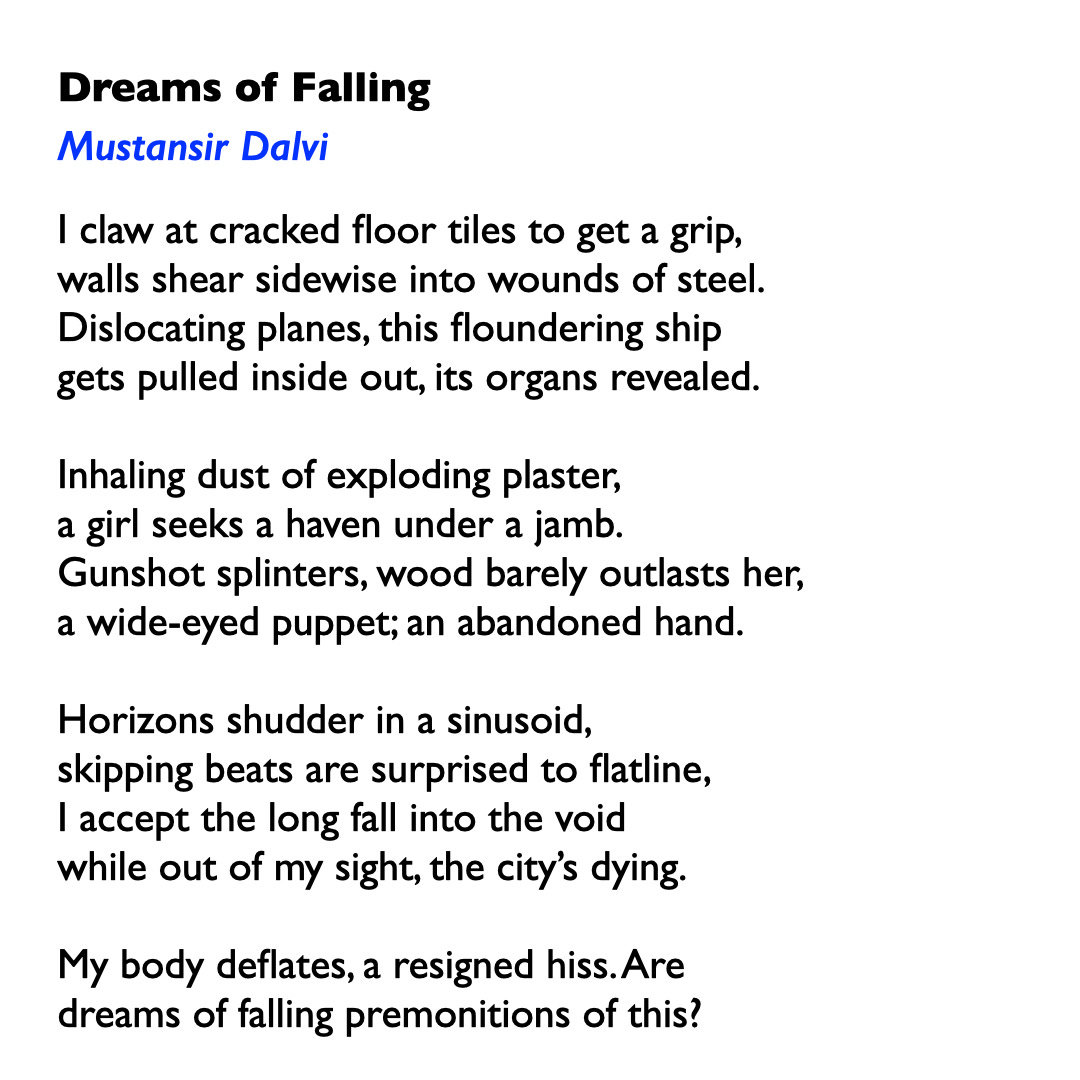Ever since I saw the videos of the young Afghani men falling to their deaths from the sky, I have not been able to erase it from my mind. Imagine their desperation, and what they were fleeing from - what led them to this impossible, fatal attempt to escape. The identities of the three men who lost their lives have now been reported in local and international media - Fida Muhammad, a 22 year old dentist from Kabul, Zaki Anwari, a 19 year old footballer who was a part of the National Youth Team, and 17 year old Raza. Raza’s brother Kabir is also said to have lost his life in the mayhem that ensued as the American plane attempted a take-off even as Afghanis surged around it, attempting to escape.
I have been thinking about the notion of “falling”. This image, more than any other bloody, torturous experience, horrific in itself, is going to define the regime of terror that shrouds Afghanistan today. But more than that, I believe that will become an emblem of the suffering that has preceded it, and that is to follow - the effect of the pandemic on marginalised communities, the alarming global incline towards fascism and hard right power centres in many parts of the world, and Climate Change, and the impact of the continuing torture we inflict as a civilisation on our environment.
Our attention spans are short, though, and we find new distractions. This is the nature of suffering, perhaps, how insignificant it can become (that old, familiar tableaux about bourgeois families sitting before the telly seeing scenes of war and bloodshed and going back to their dinner with a cursory “How sad!”, comes to mind) while, at the same time, how real, and catastrophic. Auden talked about this notion of catastrophe and perspective, in one of my favourite poems, about Brueghel’s Icarus:
“About suffering they were never wrong,
The old Masters: how well they understood
Its human position: how it takes place
While someone else is eating or opening a window or just walking dully along;……In Breughel's Icarus, for instance: how everything turns away
Quite leisurely from the disaster…
…Something amazing, a boy falling out of the sky,”
Among the many artists who have contemplated the fall of Icarus, Jack Gilbert uses the mythic reference to talk about failure, and falling, but with a reversal of sentiment - “I believe Icarus was not failing as he fell,/ but just coming to the end of his triumph”. And so it is that this falling is both the downward spiral, and the attempt. We must be generous in our vision of humanity, and find hope in the voices that cry out against the suppression of it. We must imagine that the deaths of those who have fallen are not in vain, and that we will organise, and agitate, once again. That is our lot.
I share with you today, two poems about falling. The first, by Mustansir Dalvi, Dreams of Falling (From Cosmopolitician, Poetrywala 2018), was written after the Gujarat earthquake in 2001, and was recently shared by him in the context of the event that I have referred to in the beginning of this post (but also other tragedies human-made and natural).
The language hits hard, spraying the detritus of self and terror in a centrifugal exhortation, carrying a disorienting chaos of fragments. The dissonant images are a juxtaposition of the inanimate, and the barely living. They convey a picture of disorder with the reflective gaze of a broken mirror. The paranoia of this sonnet starts with a bang at the beginning (“I claw at cracked floor tiles to get a grip”) from the self of the persona, then ventures into the vision of “the city’s dying”, like a breathless, incoherent cameraperson (the half rhymes further enhance this feeling), and then recedes back into the self - “My body deflates, a resigned hiss.” This poem speaks to me in so many different voices - it brings home the very real experience of suffering as both detached and intrinsic - similar to how Amichai talks about the ‘circle of pain and time’ in his ‘The Diameter of a Bomb’ that I shared recently. How it resides in the body, even when it is distant, and how it is triggered again and again, in complex ways. The feeling that the poet describes is both startlingly real and surreal at the same time. The final question about a ‘dream of falling’ being a premonition of this experience (a recurring motif of terror and fear in so many artistic text) puts into perspective the human position of suffering, and our schizoid and permanently truncated relationship with pain and death, and the fearful anticipation of things falling apart.
Meherin Roshanara’s untitled poem uses minimalism and the concrete form of the words itself to reframe this image of people falling from the sky within the larger context of this year so far, and how strange, uncertain and absurd its experience has been for many of us. This poem, too, refers to our apathy, and how we are caught in the peculiar experience of being both far from tragedy, and yet, complicit and deeply connected with it.
I share both these poems with you because they helped me give a form to this experience of the time.
Subscribe to Poetly to receive regular capsules of poetry and commentary in your inbox





